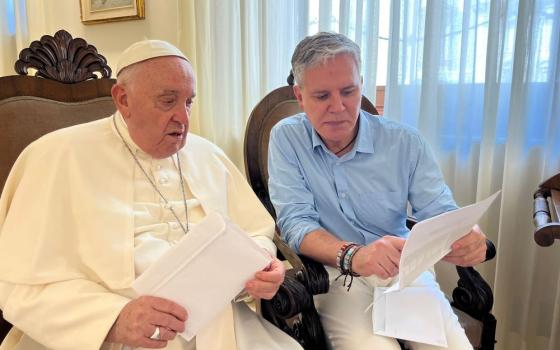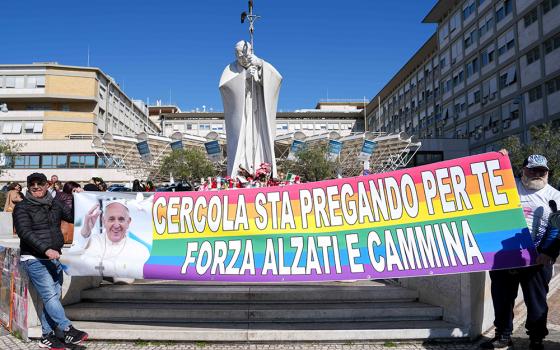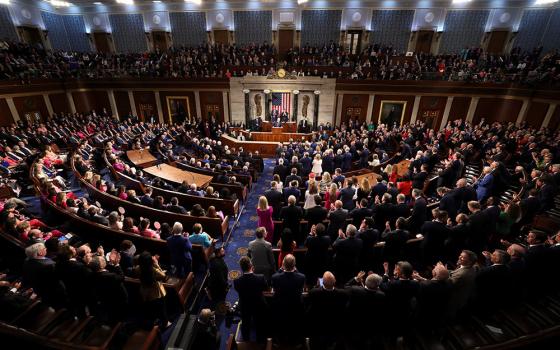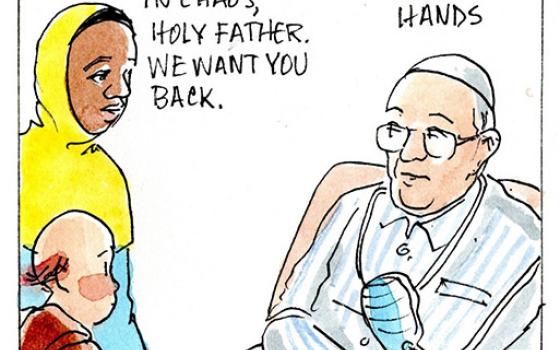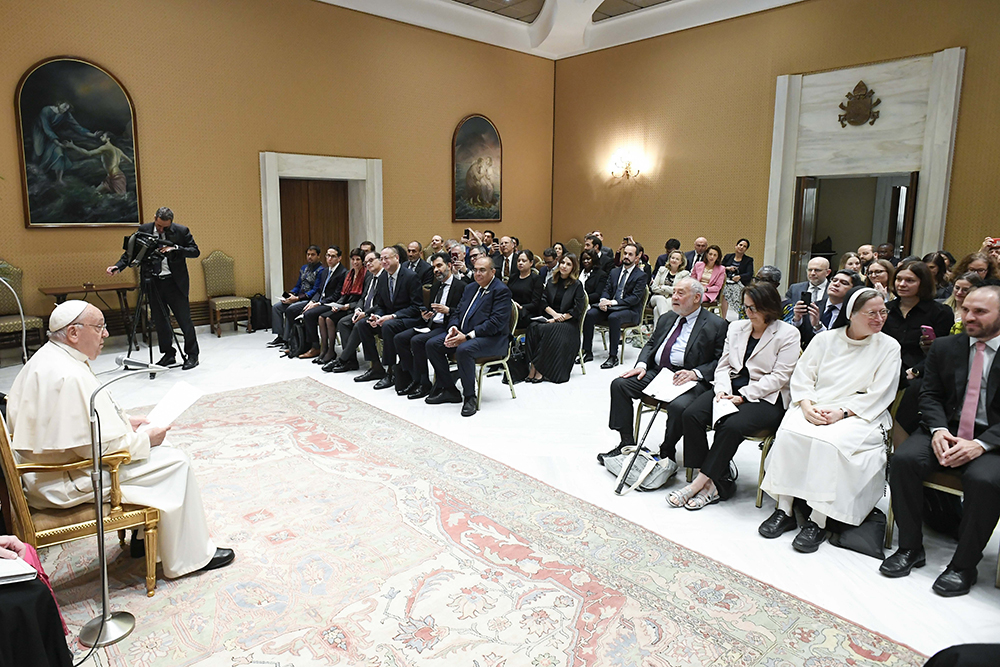
Pope Francis meets with academic experts, policymakers, officials from multilateral institutions and religious leaders meeting with the Pontifical Academy of Social Sciences to discuss the foreign debt crisis June 5, 2024, at the Vatican. (CNS/Vatican Media)
Ahead of the Vatican's 2025 Jubilee Year, Pope Francis pressed world financial ministers and leading economists to support an international mechanism to alleviate foreign debt, lamenting that a "poorly managed globalization" has deprived millions of people of a "dignified future."
"We find ourselves facing a debt crisis that mainly affects the countries of the south of the world, generating misery and anguish, and depriving millions of people of the possibility of a dignified future," said Francis on June 5. "Consequently, no government can morally demand that its people suffer deprivations incompatible with human dignity."
The pope went on to call for a "new international financial architecture" that breaks the financial-debt cycle that has contributed to a current global debt now estimated at $313 trillion.
Advertisement
Francis' remarks were delivered during a meeting with participants in the "Addressing the Debt Crisis in the Global South" conference, which was organized by the Pontifical Academy of Social Sciences and attended by some 50 finance ministers, economists and international development agency heads.
The meeting comes as major legislation is being considered in New York and in the United Kingdom on sovereign debt restructuring and at a time when both church leaders and development groups are pushing for greater foreign debt relief. And it comes ahead of the start of the 2025 Jubilee Year, a once-every-quarter-century occurrence that includes the Biblical tradition of forgiving debts.
"Ecological debt and foreign debt are two sides of the same coin that mortgages the future," the pope told conference participants. "For this reason, dear friends, the Holy Year of 2025, to which we are heading, calls us to open our minds and hearts to be able to untie the knots of the ties that strangle the present, without forgetting that we are only custodians and stewards, not masters."
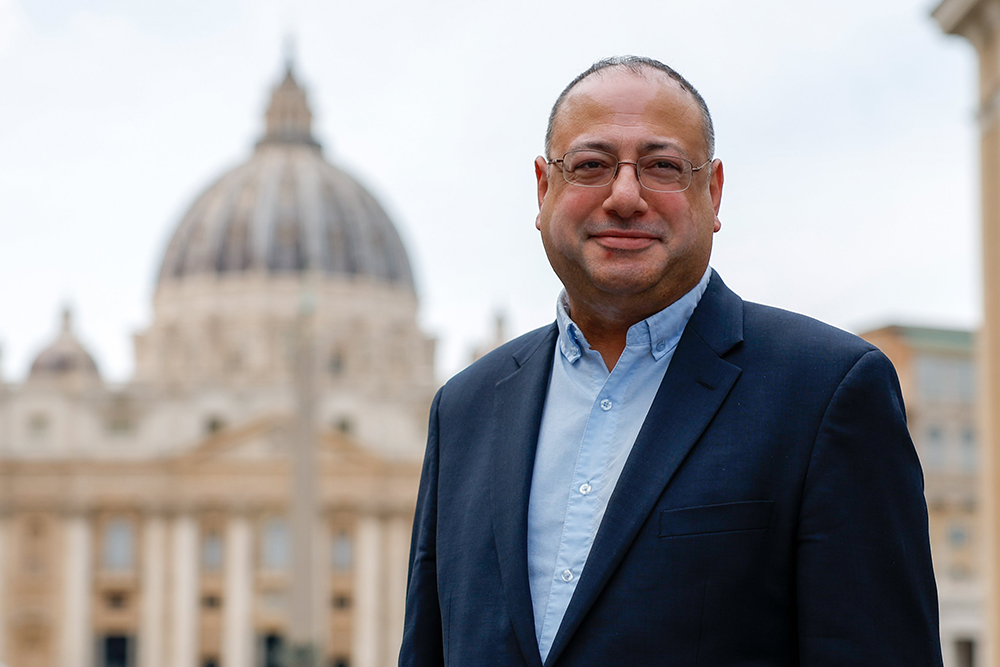
Eric LeCompte, executive director of the Jubilee USA Network, poses for a photo at the Vatican June 4, 2024. (CNS/Lola Gomez)
Eric LeCompte, the leader of Jubilee USA, a network of religious and development groups that advocates for international debt relief, described the pope's remarks as "powerful and forceful."
LeCompte, who attended the Vatican conference, told the National Catholic Reporter that "secular institutions are aware that 2025 is a Jubilee Year" and are interested in using it to push new policies to offer a better global financial model.
"Debt can no longer be disconnected from climate change and mitigation and adaptation," said LeCompte, who believes that the pope has always understood this to be the case, most evidenced by his landmark 2015 environment encyclical, Laudato Si'.
"The north really owes a debt to the south because we took all of their resources, fueled industrialization, created the climate change that the south no longer has the resources to deal with," he said. "We took from them and now we owe them a debt to be able to deal with climate mitigation and adaptation."
In his June 5 remarks to economists and financial leaders, Francis said that a multi-national mechanism for dealing debt is needed to counteract an "every man for himself" attitude, where "the weakest always lose."
"Debt can no longer be disconnected from climate change and mitigation and adaptation."
— Eric LeCompte
According to LeCompte, what the pope is really demanding is a "global transformation of our financial system."
While Francis, he argued, is only building on the teachings of Popes John Paul II and Benedict, LeCompte said that Francis offers the distinction of speaking from a place that has been directly affected by long standing economic crises during his time as Archbishop of Buenos Aires.
"He stared down the barrel of a gun from these vulture funds in Argentina … and led his country through the greatest economic crisis the country had ever faced," said LeCompte. "He has a direct understanding of these issues, saw what they did and saw what inequities in the financial system does to developing countries."
While LeCompte acknowledged that not everyone in the room is on the same page as how to move forward, Francis, he said, has the "ability to bring people together and convene people to dialogue to get us all to go a little bit further."

